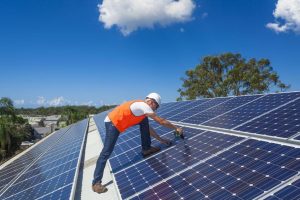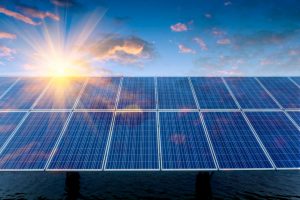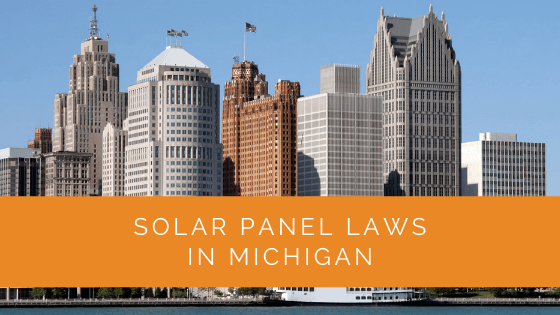 Michigan has one of the highest energy rates in the country. If you are a homeowner in Michigan, you save more when you go solar. The high energy rates mean you will save more for every kilowatt-hour you don’t purchase from utilities by going solar.
Michigan has one of the highest energy rates in the country. If you are a homeowner in Michigan, you save more when you go solar. The high energy rates mean you will save more for every kilowatt-hour you don’t purchase from utilities by going solar.
Contents
Key Takeaways
- Michigan’s high energy rates make going solar financially advantageous for homeowners, as they can save significantly on electricity costs.
- The state offers incentives, including the Federal Solar Investment Tax Credit, property tax exemptions for solar installations, and net Metering, which allows solar users to offset their electricity bills by sending excess power to the grid.
- The payback period for a 5 kW solar system in Michigan is around 15-20 years, making it a worthwhile long-term investment, especially considering the 25-year warranty on most solar panels.
Introduction
Michigan is a great state to go solar as the state receives high amounts of sunlight yearly. The state averages four peak hours of sunlight per day. During the summer, the state can have at least six hours of sun exposure daily.
Michigan has more than 11,000 inland lakes, hence the great lake state. Michigan has maintained this natural beauty and aesthetic, and upholding its beauty is among the state’s goals.
This goal has prompted excellent solar innovations. Michigan has maintained its reputation as a solar energy leader because its progressive government enables households to go solar through incentives and loan programs.
The initial investment of acquiring a solar-powered system and the savings that will be achieved depend on the photo-voltaic system’s capacity.
Things to consider when you are getting a solar system are your roof’s size and your yearly energy consumption. This will determine the capacity of kilowatts that you require. An ordinary home can get decent results using a 5 kW solar system.
A solar payback period refers to the time a property owner will take to plow back initial investment through savings on electricity after investing in a solar-powered system. A 5kW solar system costs an average of $20,000 in Michigan. The average electricity price in Michigan is $0.14 per kilowatt-hour; this is higher than the national average. The average payback period is around 15-20 years for a 5 kW solar system.
Since the solar system starts generating electricity once installed, you enjoy the benefits of free energy. Most solar panels come with a 25-year warranty, so you don’t have to worry about any other costs after your initial purchase.
Going solar is a good investment in Michigan because every unit produced is worth more than the average price of electricity in the US.
Acquiring a solar system by paying cash upfront is best to receive maximum savings from going solar. There are other affordable options for people who can’t afford to pay cash upfront; you can opt for a solar loan or a lease.
Familiarising yourself with the various policies surrounding solar panels and solar systems installations is essential. Most policies are centered on encouraging people to adopt solar energy instead of burning fossil fuels to obtain energy.
Here are the various solar panel laws in Michigan.

Federal Solar Investment Tax Credit
Federal Solar Investment Tax Credit is the most significant saving you will receive when you go solar. This perk is also known as Investment Tax Credit (ITC). This tax credit is 30% of the initial cost of the solar system. This includes installation costs and labor. For a solar system that will cost you $20,000 to install, you are granted $6,200 in terms of a tax credit.
The tax credit means you can deduct 30% from the taxes you owe to the government. You can remove the whole amount on the taxes due for one year. If you don’t pay enough, you can deduct the amount in subsequent years till you are fully compensated.
Property Tax Exemption
Installing solar panels in Michigan can make the value of the property rise. On average, installing solar PV increases the value of a house by $15,000. Property taxes are set depending on the value of homes and the property they are built in.
When the value of a house increases, the property taxes to be paid also increase. Michigan passed a law that exempts solar from being included in property taxes. This means that you will not pay any extra taxes for installing a solar system in your house, which adds to the total savings you receive when you go solar.
Net Metering in Michigan
Net Metering allows users who have installed solar systems to continue being connected to the grid. When your solar panel produces more power than your household needs, the grid will adapt extra power to supply another load elsewhere. You receive solar credits for every electricity you send to the grid.
When your solar panel isn’t producing enough power, especially during the winter, or your house needs more power than your solar system can produce, you can get power from the grid. The solar credits earned will be used to offset your electricity bill.
However, the Michigan Public Service Commission removed full retail net Metering in the state. Now, customers receive credit for their solar power at the power supply component minus transmission charges. This means you will be credited half of the full retail for the power you send back to the grid.
You must size your solar system to cater to your household’s usage and have an onsite energy storage system.
If you plan to install solar energy in Michigan, you need to know about these laws and how they apply to you.

Case Study: Residential Solar Installation in Michigan
Background
At Solar Panels Network USA, we recently undertook a solar installation project for a homeowner in Michigan. The homeowner was motivated by the high energy rates in the state and the desire to reduce their long-term electricity costs. With Michigan’s abundant solar incentives, they were eager to take advantage of these benefits.
Project Overview
The project involved installing a 6 kW solar panel system on the homeowner’s property. The house had a south-facing roof with minimal shading, making it an ideal candidate for solar energy production. Our goal was to maximize the homeowner’s savings by leveraging Michigan’s solar incentives and ensuring optimal system performance.
Implementation
We began with a detailed site assessment to determine the best placement for the solar panels. The installation process included:
- Mounting High-Efficiency Solar Panels: We installed 20 high-efficiency solar panels on the south-facing roof, ensuring maximum exposure to sunlight.
- Integrating with Net Metering: We connected the solar system to the grid to take advantage of Michigan’s net metering policy. This allowed the homeowner to send excess electricity back to the grid and earn credits.
- Optimizing with Energy Management: An advanced energy management system was installed to monitor real-time energy production and consumption, helping the homeowner to understand and optimize their energy use.
Results
The installation yielded impressive results. The homeowner saw an immediate reduction in their electricity bills, thanks to the energy produced by the solar panels. By utilizing the net metering system, they earned credits during peak production periods, which offset their energy costs during the less sunny winter months.
The combination of the Federal Solar Investment Tax Credit and the property tax exemption significantly lowered the initial investment cost. The homeowner received a 30% tax credit on the installation costs and benefited from increased property value without the burden of higher property taxes.
Additionally, the energy management system provided valuable insights into their energy consumption patterns. This allowed the homeowner to make informed decisions about their energy use, further enhancing their savings.
Summary
This case study highlights the significant benefits of solar installations in Michigan. Despite the high initial investment, the combination of state incentives and high energy rates ensures a favorable return on investment. By leveraging the Federal Solar Investment Tax Credit, property tax exemptions, and net metering, homeowners can maximize their savings and contribute to a more sustainable future. At Solar Panels Network USA, we are committed to helping homeowners navigate these opportunities and achieve optimal results from their solar installations.
Expert Insights From Our Solar Panel Installers About Solar Panel Laws in Michigan
Understanding Michigan’s solar incentives, like the Federal Solar Investment Tax Credit and property tax exemptions, is crucial for maximizing your investment. These benefits can significantly reduce your initial costs and increase your long-term savings, making solar an even more attractive option.
Lead Solar Installer
Net Metering in Michigan offers a great opportunity for homeowners to offset their electricity bills. By sending excess power back to the grid, you can earn solar credits that help balance your energy costs during less sunny periods, especially crucial during the winter months.
Senior Energy Consultant
The combination of high energy rates and generous state incentives makes Michigan an excellent place for solar installations. Not only do homeowners save on their electricity bills, but they also add value to their property without the burden of increased property taxes.
Solar Project Manager
Experience Solar Excellence with Us!
Trust in Solar Panels Network USA, where our seasoned experts deliver top-quality solar solutions for homes and businesses nationwide. With a legacy of countless successful installations and a commitment to sustainable energy, we’re your reliable partner in the solar journey. Ready for a brighter, eco-friendly future? Call us now at (855) 427-0058 and harness the power of the sun!
Map image by Wikimedia Commons User: TUBS / CC-BY-SA-3.0
About the Author
Solar Panels Network USA stands at the forefront of solar energy solutions, driven by a team of seasoned solar engineers and energy consultants. With over decades of experience in delivering high-quality solar installations and maintenance, we are committed to promoting sustainable energy through customer-centric, tailored solutions. Our articles reflect this commitment, crafted collaboratively by experts to provide accurate, up-to-date insights into solar technology, ensuring our readers are well-informed and empowered in their solar energy decisions.

